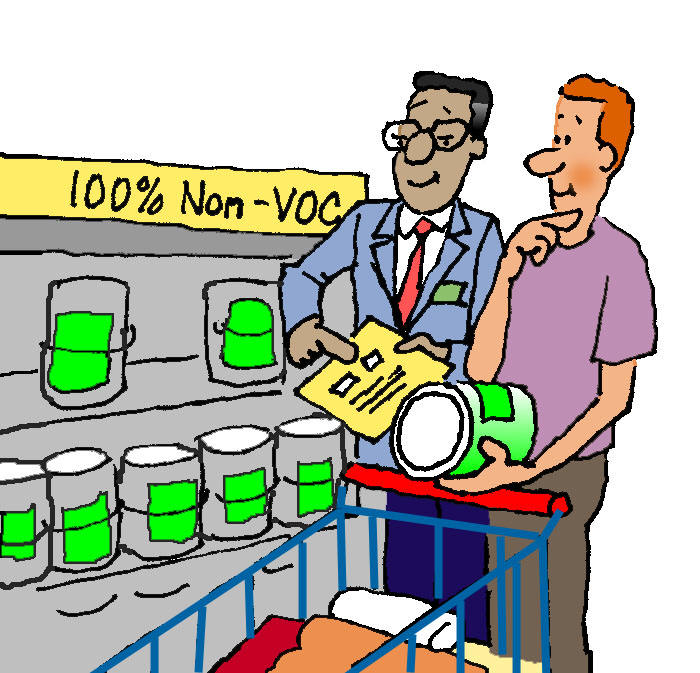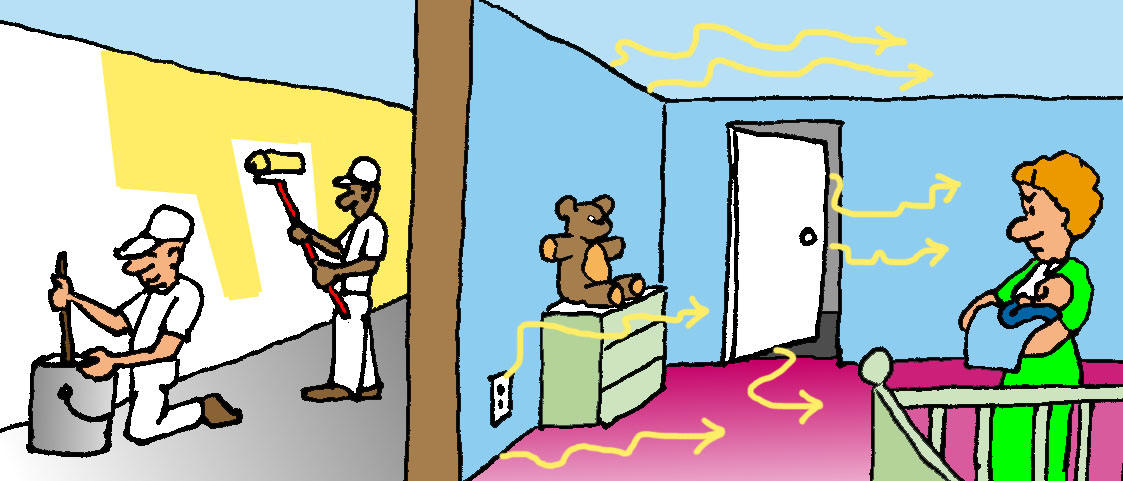VOCs: Paints, Cleaners and Other Solvents
Many paints, varnishes, adhesives, cleaners and other products used in the maintenance and remodeling of buildings give off volatile organic compounds (VOCs) — chemicals that evaporate in the air — that could lead to indoor air quality problems.
The health effects of VOCs vary widely depending on the type and concentration of chemical in the air; the length of time a person is exposed to the chemical; and a person's age, pre-existing medical conditions, and individual susceptibility. Eye and throat or lung irritation, headaches, dizziness, and vision problems are common symptoms from exposure to VOCs.
Residents, property managers, and painting and remodeling contractors can take simple steps to reduce short term exposures to harmful chemicals from these common products.

Product Selection
Products that are VOC-free or low-VOC are available in many cases. Information on VOC content is typically found on a product’s label or can be found on the product’s material safety data sheet (MSDS), which should be available from retailers that sell paints and other chemical products and contractors that use them. The MSDS provides details on the concentration of specific harmful chemicals in a product, as well as procedures for responding to overexposure.
Unfortunately, “Low-VOC” is not a clearly defined term, and manufacturers may apply this term differently.
Green Seal , an organization that develops sustainability standards for products, services and companies, has developed a standard for paints, coatings, stains and sealers that specifies the following VOC limits:
| Product | VOC Limit (g/L) |
|---|---|
| Flat Paint | 50 |
| Non-Flat Paint | 100 |
| Non-Flat, High Gloss Paint | 150 |
| Floor Paint | 100 |
It is advisable to compare product labels to find the applicable product with the lowest available VOC content.
Ventilation
Although product manufacturers usually place proper-use labels on retail product containers, these labels often contain only general language such as "only use in ventilated areas." Such labels are not detailed enough to explain practical methods of reducing human exposure to the chemicals in these products. Unlike large office buildings and schools, private single family homes, townhouses, and apartments are usually not mechanically ventilated.
Many people mistakenly believe that air conditioners and furnaces adequately filter indoor air. Most air conditioners and heating systems do not provide ventilation as they recirculate air and do not remove contaminants.
Don't Get Trapped Indoors with Bad Air
Hot or cold weather encourages residents to close windows and rely on air conditioning or heating units. If you do indoor painting, you could be accumulating VOCs in the unventilated space. Follow the ventilation recommendations below instead!
A common misconception regarding the “off-gassing” of VOCs is that it ceases once the paint or other substance is dry, or if there is no detectable odor. Most paints and other products will continue to release harmful vapors for several days after application.
For example, while many latex paints appear to be dry after several hours, ventilation should be continued for no less than 48 hours, and preferably 72 hours, beyond that time. Some of the more powerful organic compounds released through "off-gassing" are below human odor thresholds.

Multi-Family Housing Concerns
Paint and floor product off-gassing is a particularly problematic concern for residents and property managers of multi-family apartments and condominiums because vapor-laden "shared air" can move between spaces.
Painters and contractors should be aware that harmful vapors migrate across common walls, ceilings, and floors through gaps around pipes, between floors and walls, and through electric outlets. Such problems can be avoided if all apartments being painted or remodeled are properly ventilated with exhaust fans, even if no one is living in the painted unit, to prevent the accumulation of such vapors in unhealthy quantities in surrounding residences.
Property managers and condominium owners should also consider providing advance notice to neighboring residents that a unit is going to be painted or remodeled, enabling them to increase their own exhaust ventilation. Inspections should be conducted to ensure that ventilation is maintained for least 48 to 72 hours after painting, floor refinishing, or other remodeling activity involving chemical products is complete. In addition, property managers might consider temporarily providing fans to residents who are remodeling their unit.
Healthy Painting and Remodeling Guidelines
- Try to schedule painting and other activities involving chemicals for fall or spring, when windows are more easily left open for ventilation.
- Choose 100% non-VOC paints and related products, or ask for assistance in selecting low-toxic, low-VOC products from qualified retailers or contractors.
- Keep windows wide-open for at least 48 to 72 hours after painting, refinishing floors, or other activity involving chemicals.
- Use window-mounted box fans to exhaust vapors from the work area. If fans cannot be used, make sure that rooms being painted or remodeled have proper cross-ventilation.
- Provide advance notice to adjacent units that a job is to begin.
- Take frequent fresh air breaks while painting and use masks or other respiratory protection. Avoid painted rooms for at least 72 hours whenever possible.
- Keep pregnant women and young children from freshly painted rooms.
- Leave painted areas if you experience eye watering, headaches, or dizziness.